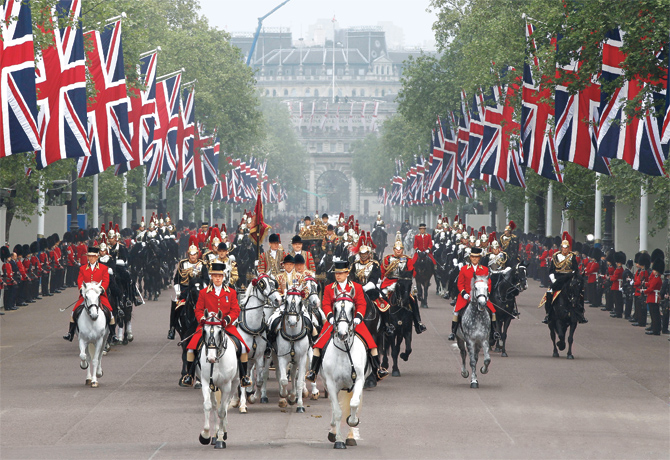
A million people gathered for a glimpse of the 2011 wedding procession of Prince William and Catherine Middleton
(3 of 3)
The benefits to the countries that maintain a link to the Crown are hard to quantify. That does not mean they do not exist. A relationship with the Queen, at least in some eyes, still confers status and enhances national cohesion. "Monarchy is extremely important to this country," Prime Minister David Cameron told Time. "It's a reminder of our history and a symbol of national pride. But above all, it's important because right at the top of British life we have this institution that is nonpolitical, that isn't subject to the winds of change. That gives a certain strength and stability to this country, that people of all parties and none have an institution they can admire and feel proud of."
The Queen may have her Prime Minister's vote, but she works hard to steer clear of anything that could be construed as party politics. The body of conventions that combine to create Britain's unwritten constitution demand of the monarch a scrupulous neutrality that can be tested if she is called on to perform another of her duties and appoint a Prime Minister. Usually she rubber-stamps the voters' or parties' choice, but the sudden resignation in 1957 of Prime Minister Anthony Eden and a subsequent stalemate over his replacement created a problem. She followed the advice of senior politicians in appointing his successor but attracted criticism from supporters of the unsuccessful candidate. More recently, in May 2010, when parliamentary elections failed to produce a clear majority, the Queen stood back and waited for the parties concerned to reach a resolution. Five days after polling stations closed, Cameron traveled to Buckingham Palace so the Queen could officially appoint him to lead the coalition government the politicians had hammered out without her intervention.
That does not mean the monarchy has no role in the transition from one government to the next. The monarchy provides a symbol of stability and continuity at just such times, says Dr. Richard Chartres, the bishop of London; it is "the element in the constitution that is beyond partisanship." Chartres, a royal advisor and family friend who led the funeral service for Princess Diana and gave the sermon at the wedding of William and Kate, asserts that royalty is at the core of British life: "Our head of state stands for common human values, exemplifies the life we all know. And the fact that the focus of unity is someone without raw political power but exemplifying those values has a considerable impact on the life of the community at every level, because people are brought to see that there is a realm beyond the clash of ideas and programs. And that humanizes a society."
The millions of people who lined the route to Westminster Abbey for William and Kate's wedding or Diana's funeral and the millions more who will celebrate the Queen's Diamond Jubilee may not express in such high-flown terms the reasons they consider these events worth marking. Some will say they like the Queen. Others might talk about Kate's beauty and Diana's, or their emotional connection to figures most of them have never met. A smaller number will grouch about them. Everyone has different reactions to the royal family, but nobody fails to have an opinion. In a world of constant change, the House of Windsor stands out, a familiar, fascinating landmark.
In a new book from TIME, The Royal Family: Britain's Resilient Monarchy Celebrates Elizabeth II's 60-Year Reign, Europe editor Catherine Mayer and colleagues look at Britain's resilient monarchy celebrating Queen Elizabeth II's 60-year reign. Now available in bookstores, or go to www.time.com/royalsbook to order your copy today.